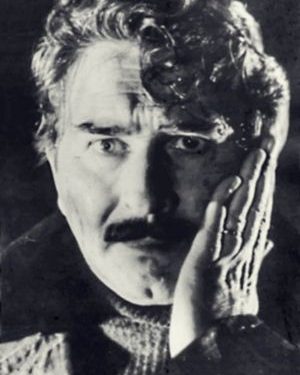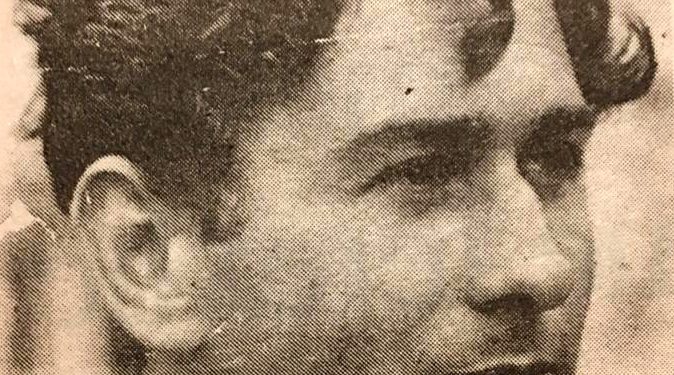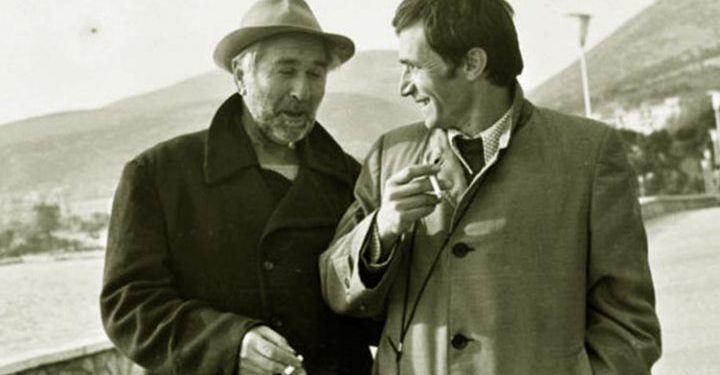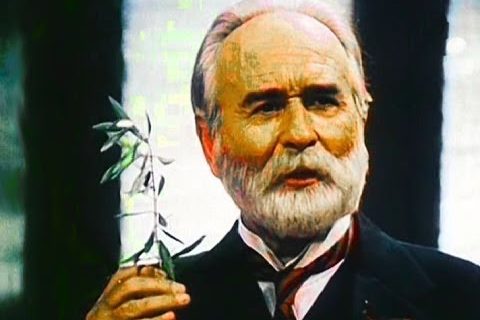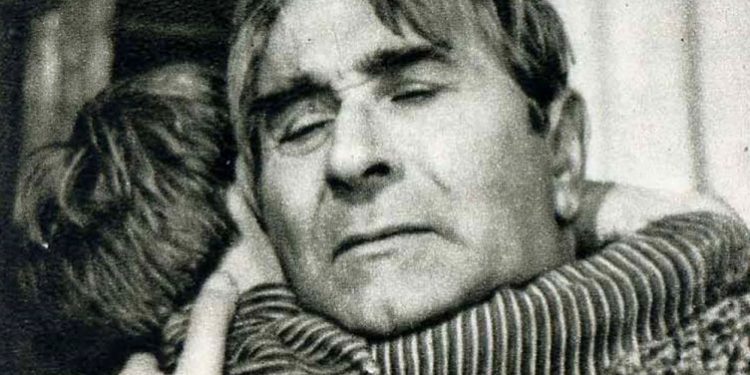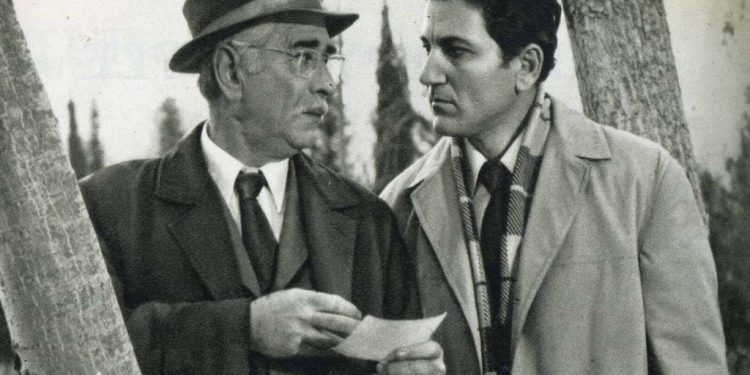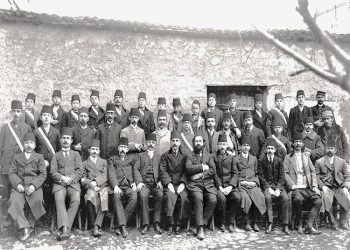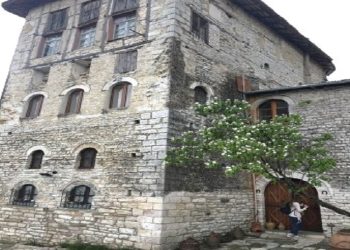Dashnor Kaloçi
Memorie.al publishes the unknown story of the actor Sander Prosi, considered one of the greatest colossi of the Albanian theater and cinematography scene, who since his youth, in addition to the work he did in the dental clinic of his brother where he went often to help him, he had a passion for music and played the guitar, violin, or sang beautifully in the choir of the Orthodox Church in Tirana, together with his close friend Prokop Mima. Their engagement as “actors” in the play “Wilhelm Tell” staged by their youngest friends in the high school of Tirana in 1943, which would then bring their arrest by the communists in November ’44, is accused of being a member of the Balli Kombëtar nationalist youth. Rare testimonies of the late actor Rikard Ljarja about his friend and colleague, as well as his son, Aristidhi, who sheds light on some unknown aspects of his father: from the preparation of roles, simple family life, friends and colleagues with whom he associated, and to his passions and hobbies.
It was March 24, 1985, when in one of the shooting grounds of the film “Shed Spring”, of the Kinostudio “Shqipëria e Re”, the scenes of which were being prepared on the beach of Durrës, Sander lost his life in a fatal accident. Prosi, one of the most famous actors of the Albanian scene and cinematography. But what was the past of Sander Prosi, where he studied and how did he become one of the stars of the Albanian theater and film?
The Prosi family
Sander Prosi was born on January 6, 1920 in Shkodra, where his mother, Aspasia, had gone to stay with her family for a while. Sandri was the last child of Jovan Prosi, of three sons and three daughters who had that old Tirana family of Vlach origin, and when Sandri was born, his family lived in an old house on Barricade Street. Jovan Prosi took care to give the children the best possible education. So Kleanthi, Sandri’s older brother, graduated in dentistry and after graduation he opened a private clinic somewhere near the New Bazaar in Tirana. After Kleanthi, his other brother, Aristidhi, also studied in the same profession, but he was not fortunate enough to live long and died in Tirana at the age of 30, after being treated in one of the clinics in Switzerland. The family experienced the death of Aristidhi twice as all of them were kept with the income of the clinic of Cleanth and Arstidhi. When Sandri was in her final year of high school in Tirana, she often went to the clinic and worked, replacing her older brother, who went to Bucharest to meet relatives of their family.
His passion, music.
Although Jovan Prosi’s children were all devoted to the profession of the dentist, little Sandri was different from them, as he showed a penchant for music when he was in elementary school. This passion was nurtured by his father, who took violin lessons from the great master, Ludovik Naraçi. Sandri also studied accordion and guitar instruments for several years, and even in the late 1930s, he won first place in a violin competition organized by the then Ministry of Education and Culture. In addition to music, he was very fond of world cinema, and at that time he collected various photographs of Italian film magazines and collected them. After graduating from high school in 1938, Sandri was able to obtain a scholarship from the Zog government to study dentistry at one of Vienna’s universities. In the Austrian capital, he studied for two years, and then his scholarship was terminated after the Italian occupation of Albania. As a result, he was forced to return to Tirana, where he occasionally helped his brother, Kleanthi, to the dental clinic. He then went to Bari, Italy, where some of his anti-fascist friends who had been interned there told him not to return to Tirana, as the war had broken out there. “I did not listen to the advice of my friends, as I had a weakness for my mother Aspasina,” Sandri recalled of his return home.
Prosi and Mima in 1943 at Wilhelm Tel
In the years 1942-43, the graduates of the state gymnasium of Tirana, among whom was the actor Naim Frashëri, staged the drama “Wilhelm Tell”. For this they asked for the help of their older friends, Sander Prosit and Prokop Mima, who had been away from school for no more than 3-4 years. This premiere was an indisputable success and Prosi and Mima deserved great credit for it. This show would also mark the beginning of their career as actors of the Albanian theater and cinematography. During the years of the occupation of the country, 1939-’44, Sander Prosi was not included in any of the political forces of that time, but according to some evidence, at the end of 1944, he was on the list of communists to be arrested, a former member of the youth formations of the nationalist organization Balli Kombëtar. Even according to some evidence, such as it was made public by Xhemal Alimehmeti, a former exponent of Balli Kombëtar’s nationalist youth, sometime in late October or early November 1944, Sander Prosi and his close friend Prokop Mima were arrested by a partisan unit and sent away. on Dajti Mountain near the village of Priska, where the partisans had improvised some old buildings as a prison and kept many of those arrested there in those days. In the middle of December, all the detainees who were there were taken down to Tirana and “settled” in the two prisons that had just been put into operation, but Sandri and Prokop Mima could be released, because in addition to their participation in the part ” “Wilhelm Tel” organized by the Balli Kombëtar youth, the investigation did not show that they had been active in the ranks of that nationalist organization. But this event and accusations as a “former member of the Balli Kombëtar Youth” would haunt Sandri and his close friend, Prokop Mima, for many years after they began working as an actor at the People’s Theater.
At the People’s Theater
After the end of the war in early 1945, Sandri and his friend Prokop Mima approached the choir of the State Philharmonic, having previously given “rehearsals”, singing in the choir of the Orthodox Church. In the Philharmonic choir, Sandri stayed until the end of 1947, when he was called to play as an actor at the People’s Theater. At that time, actors Mihal Popi, Besim Levonja, Loro Kovaçi, Prokop Mima, etc. were also offered near that theater. Sandri was activated in the first parts staged by director Pandi Stillu, as well as by the Russian Krichkov. Regarding his roles in the People’s Theater, Rikard Ljarja, one of the great actors of Albanian cinematography, recalled: to say that he has been an extraordinary man. His most prominent role was that of Horatio in “Hamlet.” I say this because, as he was a good man in both drama and movies, it is very difficult to realize roles like that of Horatio, Hamlet’s close friend. Sandri’s game with Horatio, however, was virtuoso, which made him shine with all his grandeur. Sandri had interpretive talents in film roles, which ranged from portraiture, his physique, to gestures. He knew how to distinguish very well the film from the theater, which is two completely different things, but he found himself best in the film “, Ljarja concludes for his colleague. According to the testimonies of Rikard Ljarja, but also to his other colleagues, in addition to the great work he did with the roles in the theater studios, Sandri continued that for hours, even in his house. In this regard, his eldest son, Aristidhi, recalls: “My father worked hard at home with his roles in the Theater. So I remember there from the mid-’60s, he worked for nearly four years for the role of Othello. He was so obsessed with that role that even when I was little, I was able to memorize almost most of the monologues in that drama. Likewise, when we went for a walk on the promenade of Tirana, he often whispered his roles with him. At all times, he had his mind only on the roles “, remembers his son, Aristidhi.
In the first movies
After many roles in dramas and other parts that were staged at the People’s Theater, with the creation of Kinostudjo “Shqipëria e Re”, when the first Albanian films began to be made, Sander Prosi was one of the actors who was activated with the main roles. in those movies. Thus, Sandri participated in the film “Storm” which was an Albanian-Russian co-production, and then in the film “The first years” in the role of an engineer who worked to dry that swamp. After these films with which the Albanian cinematography started, Sander Prosi continued to perform a gallery of roles, where among the most important are: State Security officer in “Special Task”, Italian in “Travel in the Coast”, Dr. Borova in “I the eighth in bronze “, the captain of the biga, in” Open Horizons “, the communist in” Debate “, Zana’s father in” Old Wounds “, as well as other main roles in” Morning Wars “,” Long Night Stars ” “,” The Path of Letters “,” War Trails “,” Threads to be Cut “,” Confrontation “,” The General of the Dead Army “,” Second November “,” Warm Hand “, etc. From the role of the school principal in the film “Debate” which was his first role in cinematography to the last in the film “Bitter Spring” in 1985, which Sandri failed to complete, he scores 29 roles from the most accomplished of Albanian cinema, which has entered the golden fund of Albanian film. In addition to these, from 1947 until the last years of his artistic career, Sander Prosi played over 100 roles in the Albanian theater.
How did Sander Prosi live?
Although Sander Prosi had a rapid rise as an actor, becoming one of the most well-known in Albanian cinema, he led a very simple life. He and his family, from his wife Filomena and his two sons Aristidhi and Adriani (both musicians) until 1976, lived in an old Tirana house, which had only one room and a kitchen, on “e. barricades “. In 1976, the state was forced to give a larger apartment to the great actor Sander Prosi. At that house, Sandri prepared most of his roles, featuring Othello, who needed four years of work. Prosi never had the habit of complaining about the conditions in which he lived and worked. Although he was one of the most famous Albanian cinematographers, he did not have a television in his house and many of the films of the time were forced to go to see his brother Kleanthi. As his colleagues and family members point out, Sander Prosi was self-contained. Regarding this, his son Aristidhi recalls: “My father led a regular family life. He did not drink alcohol, although he often frequented the bar of “Volga” and the third floor of the Palace of Culture, which were two of the places where he usually went with his fellow artists (one of his closest friends was Prokop Mima and Naim Frashëri) and drank about seven or eight coffees a day, which he accompanied with three packs of cigarettes ”.
Sandri’s passions
Like all other people and Sander Prosi in life, he had his hobbies and passions. In this regard, his son Aristidhi recalls: “My father had a passion for birds, gardelins, and canaries since his youth. He kept them in cages at home and took great care of them. Once when you needed a canary in the theater, he took one of the ones in the house and it was very bad when the cat ate it, because one of his colleagues had left the door of the cage open. Likewise, the father never gave up on music, his first passion. He kept at home a large number of gramophone records with classical and operatic music, where he most often wanted to hear Beethoven’s fourth pastoral symphony. He also had a great passion for books, although, for the very nature of his work, he did not have much time to read. In terms of world cinema, my father had an idol, the great French actor Jean Gaben, although he did not keep pictures of him at home, due to the circumstances of that time. Whenever there was a show, she would take us with her, and after it was over, we would wait for her there in front of the former Stalin monument. His father was never in the habit of cursing anyone, much less his colleagues. The great actor Sulejman Pitarka often said: “I did not leave anyone in the theater without saying a word, but the only one I never spoke to was Sander Prosi and this is not to my credit.”
Accidental death
The great actor Sander Prosi, died quite suddenly at the age of 65 when he was at the peak of his creative energies. It was 1985 when he was assigned to play a role in the film “Bitter Spring”, by Luan Rama and Muharrem Fejzo. The shooting scenes of that film were placed on the beach of Durrës, in the hotels of which the actors’ bodies were accommodated. On the morning of March 24, while Sandri was rushing out of his room at the Adriatic Hotel where he was studying the script, he tragically lost his life. The next day, in one of the halls of the League of Writers and Artists of Albania, near the coffin with his body, homage was paid by colleagues, friends, comrades, and hundreds of residents of Tirana, who escorted the great actor to the apartment. his last. For his great contribution to the development of our stage and cinematographic art, he has been honored with the high title “People’s Artist”, with Republic awards and other orders and medals. On the 25th anniversary of his death, the great actor Sander Prosi was decorated by the President of the Republic, with the Order “Honor of the Nation”, while on February 24, 2017, he was honored with the order “Gjergj Kastrioti Skënderbeu”, after death./Memorie.al




